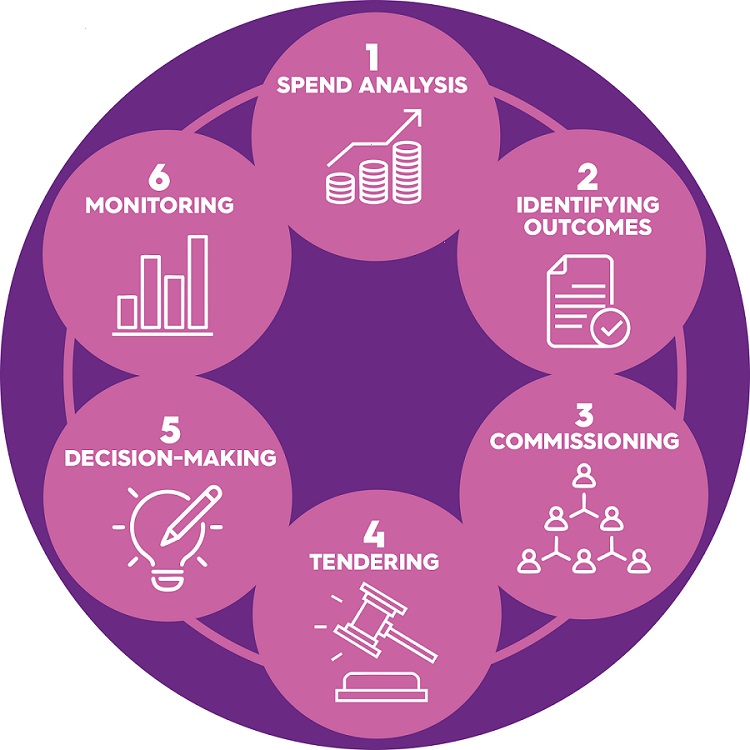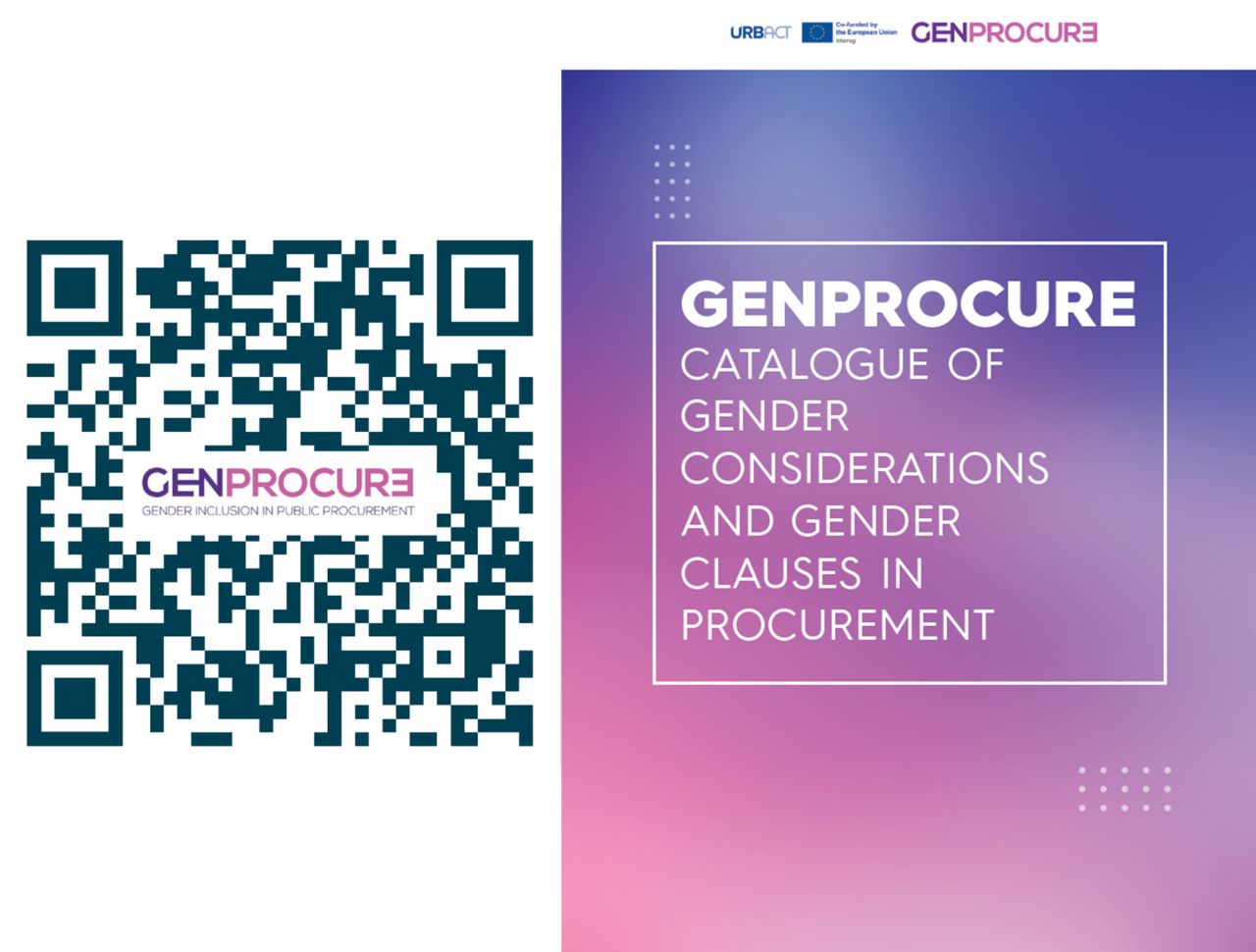The GenProcure APN is also using the final conference in Zagreb to launch our key output from the Network – ‘A Catalogue of Gender Considerations and Gender Clauses in Procurement’. This document brings together the learning and experiences of our Partners to detail how any local municipality, region, or anchor institution can consider gender as part of their procurement processes.
The Catalogue is framed by the Cycle of Procurement, six key steps at which Gender can be considered during the procurement process, and provides tips, guidance, and examples across each of those steps. In this Final Network Article, our Lead Expert, Matthew Baqueriza-Jackson summarises what can be considered around gender in the hope that others are inspired to read and use the Catalogue.

Step 1 – Spend Analysis
Local municipalities, regions and anchor institutions can undertake spend analysis that can be undertaken on an annual basis to understand where procurement spend goes geographically, sectorally, and in business type terms. They can however disaggregate this data further from a gender perspective. For example, as part of business type analysis, as well as exploring the amount of procurement spend with Small to Medium Sized Enterprises (SMEs) and Social Economy Organisations (SEOs), they could also analyse the ownership and management of those organisations – the percentage owned or managed by women, for example.
Step 2 – Identifying Outcomes (Procurement Strategy)
As part of developing a procurement strategy and identifying outcomes, local municipalities, anchor institutions, and regional governments can identify outcomes for inclusion that address gender inequalities. These outcomes may already be detailed in existing city strategies or similar, or they may be detailed in specific gender equality plans. These outcomes should be transferred across to any procurement strategy and form the basis of future steps in the ’Cycle of Procurement’ when considering gender and developing gender clauses.
Step 3 - Commissioning
There are 3 ways in which gender can be considered during commissioning.
The first is to explore whether there is a gender aspect to the good, service or work being procured and specifically whether it will affect men and women in different ways.
The second is to explore whether the gender related outcomes detailed in the procurement strategy (Step 2) are relevant to the nature of the good, service, or work being procured.
The third is to use techniques that open up the procurement opportunity to Social Economy Organisations, Women Owned Enterprises, and other diverse groups to bid and potentially win the contract. The EU Procurement Directives of 2014 have a provision in them:
For the reserving of contracts for economic operators where 30% of their workforces are disabled or disadvantaged – so-called sheltered labour initiatives.
Whereby large contracts can be broken down into smaller lots.
Around market engagement and whereby upcoming opportunities and the wider outcomes they are seeking to realise can be communicated with the potential market in advance.
Step 4 - Tendering
There are four ways to explore gender considerations during the tendering process:
The first is to utilise ‘Exclusion Grounds’ which enable local municipalities, anchor institutions and regional governments to exclude particular organisations from procurement if they have a history of not meeting certain conditions as to how they operate.
The second is to use ‘Technical Specifications’ – these are specific things that every organisation completing tendering documentation will be expected to meet around a social, environmental or gender outcome.
The third is to use ‘Award Criteria’ – these are where organisations go beyond the standard expectations of ‘Technical Specifications’ and score points during evaluation (Step 5) for doing so.
The fourth is to use ‘Labels’ - there are often EU wide standards around social or environmental practices of organisations. In relation to gender, there are ‘Labels’ such as the family audit label which certifies the performance of meaningful work-life balance within organisations.
Step 5 – Decision-Making
Local municipalities, anchor institutions and regional governments can add a third factor during decision-making and in addition to traditional cost and quality, and which is scoring and weighting against responses to ‘Award Criteria’ questions around social, environmental and gender outcomes. For example, for a construction project, they may want the weighting to be 30% price, 50% quality, and 20% around gender outcomes. Local municipalities, anchor institutions and regional governments therefore need to score the responses of bidding organisations around the gender focused ‘Award Criteria’ questions in a qualitative and quantitative way. This can be undertaken by both procurement officers and gender specialists, and they should read through the responses and offer points based upon the quality of their response and using a scoring system.
Step 6 - Monitoring
Local municipalities, anchor institutions and regional governments can monitor the gender outcomes agreed to by the successful bidder in three ways:
First, monitoring can be undertaken in a quantitative way and where the chosen supplier provides output data at various times during the delivery of the contract against specific indicators.
Second, monitoring can be undertaken in a qualitative way, and where the chosen supplier tells the story of the impact of including the gender outcome upon the people benefiting from it.
Third, monitoring can be undertaken in a retrospective way, and where after the contract is completed, the chosen supplier is sent a survey with a series of questions about their contributions to the realisation of wider local economic, social, environmental and gender outcomes.
It has been an honour to be the Lead Expert of the GenProcure APN – each of our Partners have achieved a huge amount and we are hopeful that our Catalogue will continue to support and influence cities to make real change in their approach to procurement. We also hope that the Catalogue supports URBACT in remaining at the forefront of influencing procurement policy-making at the EU level.
Matthew Baqueriza-Jackson is the Lead Expert for the GenProcure Action Planning Network.

